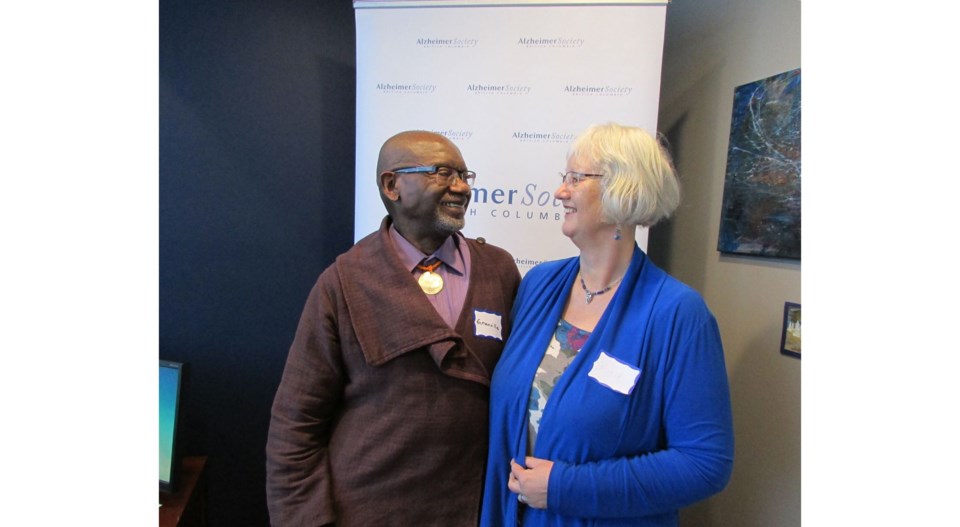The annual Alzheimer's Walk in May, will honour Granville Johnson, 71, who was diagnosed in 2016.
Before his diagnosis, Johnson experienced symptoms that didn't quite fit the norm. He said he was happy to finally have a label put on it because for a long while some medical practitioners kept telling him it was all in his head - and now he knows it really is.
Symptoms started in 2010, Birgit Luesgen, Johnson's partner of 18 years, said.
He was then diagnosed with peripheral neuropathy, which sees damage or disease to nerves that make up an intricate network that connects the brain and spinal cord to the muscles, skin and internal organs. There were other conditions as well but the first things Luesgen noticed that spoke to a form of dementia was when Johnson started forgetting things and misplacing others.
He's best known in the community as a drummer and for the last two decades he's been drawing and doing digital collages online.
"The only time I can get away from my obsession with Alzheimer's is when I am painting pixels or I am playing my drum because everything else is completely co-opted by dementia," he said. "And how that's influenced me in my art is now I am writing songs about the experience."
He already has three completed and he's working on a fourth.
"So in a way it's breathed new life into my heart," Johnson said, who will soon be looking to set up a blog to give voice to his experience with the disease while he still can.
(Check out Johnson's song called The Day Will Come about his dementia journey.)
Johnson said he'd like to help remove the stigma that he didn't even know came with the diagnosis.
"From my point of view the diagnosis of dementia is a lot like cancer, there's a bit of interest, but there's not a whole lot of support - yet," he said. "I find it really strange - I read that one out of five people have some form of dementia, which means hundreds of thousands of people are part of "the club" - I call it the club - but it's not very well recognized."
Johnson said sometimes what's in his head won't come out of his mouth.
"But I refuse to let it quiet me," he said. "But at the same time when I'm in a discussion I listen rather than speak. I do tell everyone who I am interacting with that I have dementia so when I am stuttering over my words and having trouble I don't have to fake it. I don't have to hide it. I think a lot of sufferers out there just get very, very quiet and then life becomes very quiet and mono-focused. As Birgit can attest, I was very self-absorbed before this, and now it's even worse."
Although it has changed Johnson's and Luesgen's relationship, Johnson said it's become better in some ways as they came closer to battle against what the disease has taken away and will continue to take away from them.
"Birgit has learned that you can't argue with an Alzheimer's patient," he said.
"He's got a good excuse now," Luesgen bantered back. "We certainly have changes in how we interact and our relationship changes because I am now the care partner so I take care of him and he does take care of me in certain ways, but still for me it's now gotten even more important at this stage of my life that I'm living healthy so that we can manage for another few years depending how far this progresses, which is an unknown."
Through this progressive disease, Luesgen said she's learned to take a lot more things day by day.
"I can't dwell on all the losses and all the things we can't do anymore and what we had envisioned what we'd do when we retired," Luesgen said. "We still have a very high quality of life and we just enjoy that."
"There will come a day when the thought of the loss of yourself makes you a basket case," Johnson said. "Then there will not be much cognitive direction at all."
During that time period, Johnson said he'd like to move to the Lower Mainland because that's where his three children reside. Johnson referred to the progressive stages of dementia as the second and third tertiary.
"And I don't want Birgit to have to deal with that."
Luesgen tried to interrupt because she has other ideas but Johnson insisted on finishing his thought.
"I don't want Birgit to have to deal with that because I will no longer be me," he stated.
"Basically I will be a body, an immobile entity but my personality and all my cognitive worth and self-worth will be gone. I feel like at that point I need to reward my wife for all her support and give her her life without having to hang with me for who knows how long."
Luesgen shooke her head but Johnson was adamant.
"No, who knows how long that will be - it could be five, 10, 20 years," he said. "And by that time that's not much time left for you, dear."
"And we'll cross that bridge when we get to it," Luesgen responded. "It's hard to say what it's going to be like and what's going to happen. I think we have to plan for the worst and hopefully live with the best."
Johnson smiled at Luesgen.
"This is brand new ground," he said.



